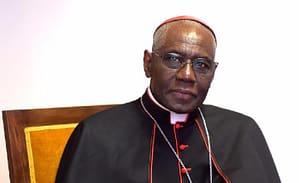
Date of Birth: June 15, 1945
Place of Birth: Ourous, Guinea (Coniagui ethnic group)
Religion: Roman Catholic (Traditionalist)
Title: Cardinal, Prefect Emeritus of the Congregation for Divine Worship and the Discipline of the Sacraments
I. Early Life and Ecclesiastical Rise
Robert Sarah was born in a remote village in northern Guinea, into a devout Christian family belonging to the Coniagui ethnic group. His path to the priesthood began early, entering seminary at age 12. He studied theology and philosophy in Guinea, Senegal, France, Rome, and later in Jerusalem, demonstrating an unwavering intellectual discipline.
By 1969, he was ordained a priest. At just 34 years old, in 1979, Pope John Paul II appointed him Archbishop of Conakry, a significant position in a Muslim-majority country. He would go on to become one of the youngest bishops of his time.
He was elevated to cardinal by Pope Benedict XVI in 2010, and in 2014, Pope Francis appointed him Prefect of the Congregation for Divine Worship, giving him authority over global Catholic liturgy until his retirement in 2021.
II. Intellectual & Theological Foundations
Cardinal Sarah is widely considered one of the most intellectually rigorous and spiritually conservative figures in the modern Catholic Church. His theological positions reflect a worldview grounded in:
Traditional moral teachings on marriage, sexuality, and gender
Liturgical conservatism, particularly in favor of the Latin Mass and “ad orientem” (altar-facing) worship
A belief in spiritual discipline, silence, and personal sacrifice as the antidote to modern chaos
Uncompromising opposition to what he calls the “dictatorship of relativism” in the West
His most influential books include:
“God or Nothing” (2015)
“The Power of Silence” (2017)
“The Day Is Now Far Spent” (2019)
“From the Depths of Our Hearts” (2020, with Pope Benedict XVI)
III. His Global Status
Among conservative Catholics, Cardinal Sarah is revered as a spiritual titan and a potential candidate for the papacy—a “papabile.” Yet his deep traditionalism has also provoked criticism. He is seen by some as out of touch with modern pastoral realities, particularly concerning LGBTQ+ Catholics, interfaith dialogue, and the role of women in the Church.
He remains Africa’s most prominent cardinal, but there is a compelling tension: Does he represent Africa to Rome, or Rome to Africa?
IV. A PowerAfrika Critique: The Paradox of Robert Sarah
Cardinal Robert Sarah’s life is both inspirational and provocative when viewed through a PowerAfrika lens. His rise demonstrates the capacity of African minds to lead in global institutions. However, it also surfaces a deep tension between spiritual representation and ideological alignment.
1. Faith as Liberation or Faith as Submission?
While traditional Christianity offered many Africans a spiritual framework post-colonization, it also came as a tool of colonial indoctrination. Cardinal Sarah, despite being African, is deeply embedded in Eurocentric theology, often reinforcing doctrines that were used to pacify African resistance and condition subservience.
Where Afrikan spirituality celebrates ancestor veneration, communal wisdom, and the interconnectedness of life, Sarah promotes Roman orthodoxy, hierarchy, and rigid individual morality.
Where indigenous systems view healing as communal and cyclical, Sarah’s Christianity emphasizes sin, guilt, and eternal judgment.
PowerAfrika asks: Can you truly liberate Africa with a theology that was once used to enslave it?
2. Africa in Service of the Church or the Church in Service of Africa?
Cardinal Sarah’s theological worldview rarely interrogates the political structures that continue to marginalize the African continent. He emphasizes personal piety over structural critique. There is little engagement with the realities of neocolonial economics, resource exploitation, or institutional racism—issues central to Africa’s material and spiritual struggle.
Unlike Liberation Theology, which arose in Latin America and focused on the poor and oppressed, Sarah’s thought remains apolitical and pietistic.
He warns of spiritual “relativism” in the West but is silent on Western economic domination in Africa.
PowerAfrika contends: Spirituality without sovereignty is submission in disguise.
3. Indigenous Knowledge vs Institutional Religion
Cardinal Sarah, like many in the higher ranks of the Church, has little public engagement with indigenous African epistemologies. His writings rarely mention African philosophies, oral traditions, or spiritual systems outside the Christian canon. For a continent as spiritually rich and diverse as Africa, this erasure is not accidental—it is structural.
He has yet to reconcile the wisdom of the Dogon, Yoruba, or Ndebele cosmologies with his own spiritual worldview.
Nor has he addressed how African cultures can be empowered within Catholicism, not merely absorbed into it.
PowerAfrika asks: Can we accept a spiritual leader who does not interrogate the dominance of one belief system over our own ancestral knowledge?
Conclusion: A Complex Symbol
Robert Sarah is a paradox—a devout African son of Rome. His intellect is formidable, his spiritual discipline admirable. Yet his worldview, shaped by an institution that once justified colonization, raises deep questions about representation, authenticity, and liberation.
He is not to be dismissed—but neither should he be blindly celebrated. For those committed to Africa’s psychological, cultural, and spiritual emancipation, Cardinal Sarah is a symbol of possibility, but also a reminder of the limits of institutional inclusion.
🔔 Follow PowerAfrika for more explorations of African minds, myths, and movements. We tell stories that unsettle, unearth, and unchain. Subscribe today, and think again.
